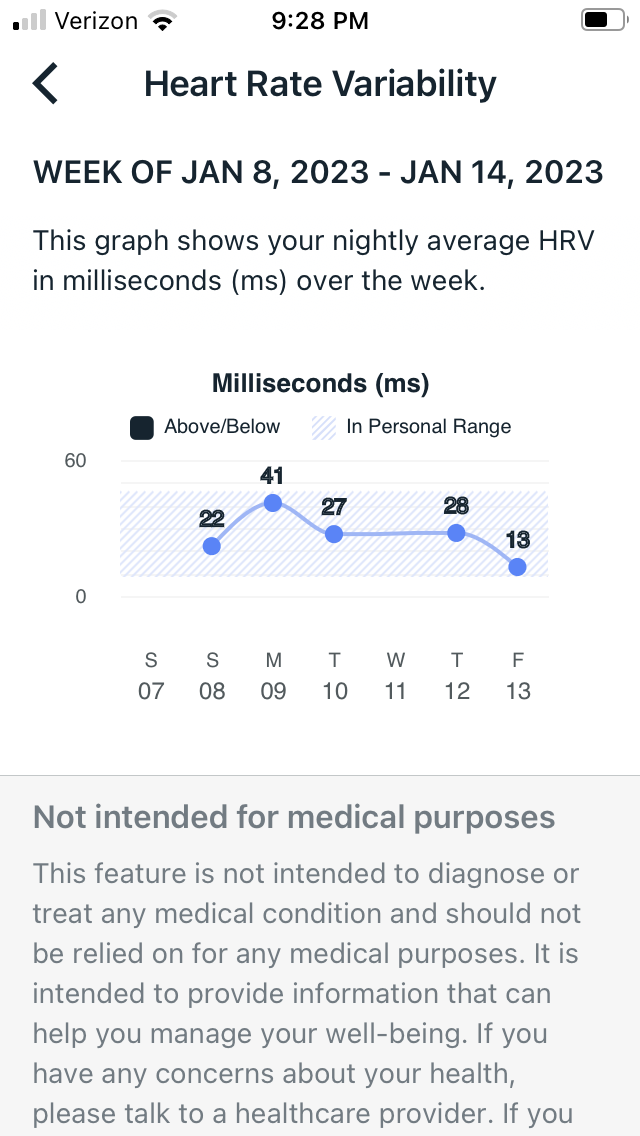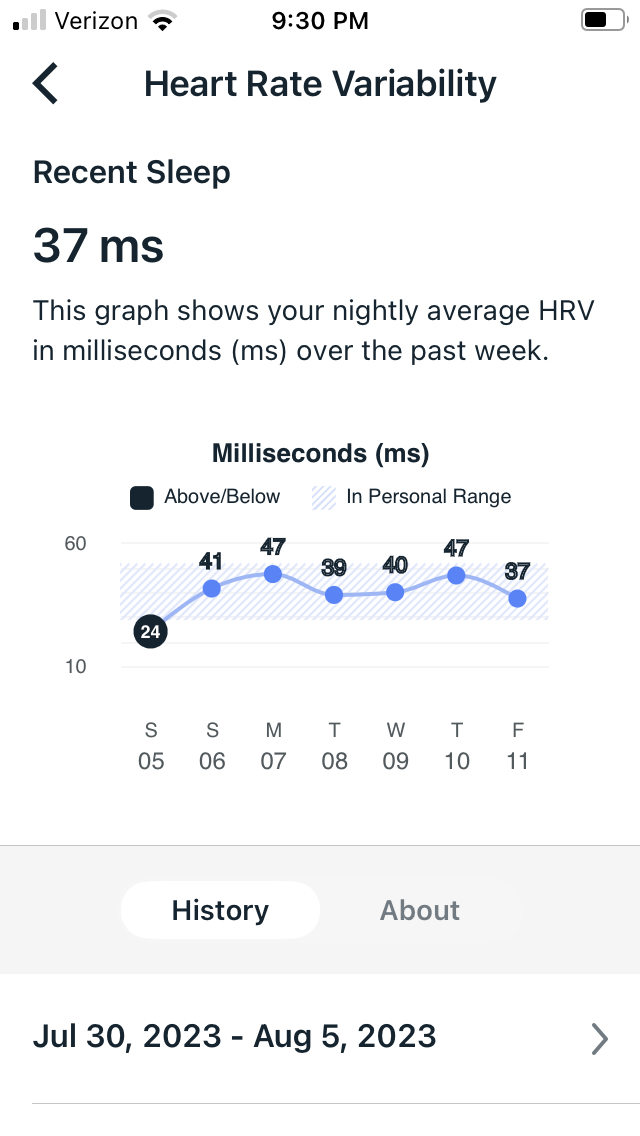Leonard
#101
I’m using an exercise App called Athlytic. They recommend taking a value same time every day, seated right after waking up, because it gives more consistent values. (The idea is to find a mean and from that see any deviations, I guess)
Nightly reading is the second best. Apple Watches makes to few readings during the night to get enough datapoints for a meaningful mean value. Unless you do some changing I “health”, and amongst other things pretend to have atrial fibrillation. Will see if I can find the full guide…
Leonard
#102
https://www.reddit.com/r/AthlyticAppOfficial/comments/113thmt/question_for_developer_opinion_on_afib_setting_to/
Link to Reddit thred, where the developer of Athlytic gives his 5 cents. You can also find a video there about how to change your settings in order to achieve more nightly readings with your Apple Watch.
1 Like
scta123
#103
I can report that on rapamycin both my deep sleep and rem have increased in the same range 25-30% but my HRV has increased around 25% nevertheless. I use Apple Watch 24/7. In last six months since on rapamycin I did not introduce any changes in sleeping habits, nutrition or exercise. Besides rapamycin I added only acabose and few benign supplements (cinnamon, cocoa, algae… and some amino-acids EAA mix and only recently in last weeks I take also some taurine).
3 Likes
Leonard
#104
Fantastic, I’m hoping that I will react like you… Of the supplements you’re mentioning I think that Acarbose (and Taurin are the ones more plausible give you better sleep… will see if I can find any correlation between my Taurine intake, sleep, pulse and HRV.
What’s your dosage and timing of taurine?
2 Likes
blsm
#105
After 7 months on rapa my HRV is generally much better. Remember I’m female and ours is usually a bit lower than males. Resting HR is also down 10 points which seems positive. I’ve noticed my HRV is much worse if I have an alcoholic beverage of any type. That 24 was measured by my Fitbit after having only one vodka with sparkling water. I was already taking taurine when I started rapamycin but I recently increased the taurine dose to 2 grams daily.


3 Likes
Tomnook
#106
500mg Arjuna before sleep appears to increase my overnight HRV by approximately 10% with immediate results.
I found this study on it’s HRV effect on diabetic rats interesting:
https://www.semanticscholar.org/paper/EFFECT-OF-TERMINALIA-ARJUNA-ON-HEART-RATE-IN-RATS-Khaliq-Parveen/a576c544276cf95b03a9a51e85cdc4c720df1a81
1 Like
Leonard
#107
Indeed intriguing. I took 5 grams of glycine and 1,5 grams of taurine yesterday and had more deep and rem sleep than usual. My mean HRV also jumpt up by ≈ 5%.
Ideally I would not have to rely on supplements to balance my nerve systems.
Will try to pick up stretching and meditating before sleep again. Haven’t done it since I became with Apple Watch.
It’s a shame that Apple don’t let you track life habits like the aura ring or whoop, to give you advice based on the habits.
Athlytic is great for tracking the exersice, but not so good about tracking habits, and certainly not about giving recommendations…
Is there another app that turns your Apple Watch to a better version of the aura?
4 Likes
I find my HRV quite variable. For some reason early this week it was what is quite high for me at 68ms. However, now it is around the 55ms mark.
Leonard
#109
That’s amazing! Especially your 10 points drop in resting heart rate. Is it the lowest low, or the mean you’re referring to? From what number to what?
My understanding is that resting heart rate is highly dependent on genetics, even though it also can be lowered to some degree with huge loads of medium and high intensity cardio… so 10 points in such a short time is actually kind jaw dropping results. Did you experience much stress previous to starting rapa, or did you stop using some stimulants at the same time?
1 Like
Tomnook
#110
I’ve used the Oura for the past three years and been quite impressed by the feedback however with the recent changes to the sleep algorithm I feel it reflects my sleep less accurately. It also now often suggests I’ve been ‘napping’ when I haven’t!
I use the Training Today app with the Apple watch and set the Health HRV readings to Afib. Very useful information once you get used to it:
1 Like
Leonard
#111
It’s a highly variable value.
As I understand it it reflects the balance between the Symphatic- and para-symphatic nervous systems. A few glass of alcohol can lower HRV for days. Stuff like dehydration, stimulants have more immediate effect. A low value can come from training hard the day before, but it can also result in high values from some kind of overcompensating mechanism. Some claim that one single measure in the morning is better than the mean… while some claim that the simple tap-test is more reliable for measuring if you’re getting over-trained.
It’s all very frustrating and I wish that Apple would put their best AI-guys to making the data more useful. Instead I put my hope to the single developer of Athlytic… 
I don’t think it’s a useless value, and I think that it in conjunction with sleep data and resting heart rate can give you a hum about training-readyness.
But, I think HRV might be more useful for tracking longer trends. Like a reminder about what happens if you sleep, drink, stress or use stimulants in ways that are bad for you.
And, you should also not compare yourself to much with others… and if keeping track of HRV stresses you out you probably fare better from turning those measurements of… 
1 Like
blsm
#112
@Leonard, the screenshots are my HRV. My resting HR when I started rapa was in the high 70’s and now it’s in the high 60’s which I understand is still probably too high. My stress has unfortunately been through the roof since 2017 due to major life changes (moving, changing jobs, a near divorce, addiction issues in a close family member, loved ones deaths ect) but covid didn’t help at all because I’m a frontline hospital worker. I haven’t used any stimulants other than coffee which hasn’t changed in frequency or amount.
Leonard
#113
Yes I’m also with Apple Watch, and Athlytic with AFIB turned on. It’s useful indeed. I chose Apple Watch over aura, because it’s supposed to be much more accurate on both the heart, and sleep measurements.
But aura seem to be so much better at analyzing the data… Apple could probably do this, but why should they take that extra cost, when instead they can earn mo e on third party apps sold in AppStore… I’m fine with that, except that app don’t seem so exist, as of today. 
1 Like
scta123
#114
I take 4g in the morning. I tried in the evening or few hours before sleep and I kept waking up. maybe this effect would be transient as some report, but I opted for morning dosing.
scta123
#115
Yes, totally. But I started noticing patterns, alcohol, interrupted sleep, exercising (during, hours after) and stress / anxiety drive the HRV down in my case. When I get enough rest, don’t overexercise and have good sleep, the average value is much higher than on opposite days.
1 Like
scta123
#116
What kind of analysis would you like or miss? I tried countless apps, but was always disappointed. Pr even using an app for this and app for that it is really annoying indeed. I also noticed that watch being really on point with numbers it does not give any analysis. Just raw data, which in some ways can be helpful but needs interpretation and a lot of knowledge about different health areas.
I agree there are patterns and I measure and record both using Polar and Fitbit each morning. However, it also does odd random things like hitting 68ms when I went to sleep quite drunk. (better than the sober results).
Normally alcohol causes a cut in HRV.
2 Likes
Leonard
#118
Ok, sorry to hear you had so rough years! Totally explains the elevation of you RHR. I’m glad to hear it’s gone down so much lately and that you seem motivated to work on getting it further down.
Would you attribute most of the change to the rapa, or have you done any other major lifestyle changes? Anyways congrats to a major change in a huge bio marker for health!
1 Like
Leonard
#119
It probably wouldn’t be nearly as life changing as I dream about it to be. Never tried whoop or aura, but heard you get interpretations and advice based on the raw data, that for Apple Watch happens to be much more accurate.
I would like to be able filling in all supplements, medicines and meals I ingest, and from that get statistical interpretations about how much each of them correlate with sleep and other bio markers. Would probably lead to noisy Interpretations of noisy data in this personal N1 study, but if you choose wisely about what to “study” at a given period, and used a bit of common sense I’m sure it could be worth something. If many users shared their protocols and agreed to let the software aggregate the data it would actually also be a possible get some severe power in terms of statistical analyses.
2 Likes
blsm
#120
@Leonard, yes primarily but possibly a bit indirectly. I started feeling good enough shortly into starting rapa that I have been able to exercise more consistently so that probably a big factor.
2 Likes